Language
About Andrew Cusack
 Writer, web designer, etc.; born in New York; educated in Argentina, Scotland, and South Africa; now based in London.
Writer, web designer, etc.; born in New York; educated in Argentina, Scotland, and South Africa; now based in London. read more
News
Blogs
Reviews & Periodicals
Arts & Design
World
France
Mitteleuropa
Knickerbockers
Argentina
The Levant
Africa
Cape of Good Hope
Netherlands
Scandinavia
Québec
India
Muscovy
Germany
Academica
Articles of Note: 13 March 2024

My then-flatmate was getting married the next day and much pottering-about sorting things was required but the idiosyncratic beauty of this building captured my imagination — part Norman, part Moorish. I was almost insulted that I hadn’t come across it in any of my bookish explorations.
The historian Edmund Harris covers Chideock in his lusciously illustrated post on Recusancy in Dorset and the ‘other tradition’ of Catholic church-building.
■ Generations ago it was said that the three institutions no British politician dared offend were the trade unions, the Catholic Church, and the Brigade of Guards. In 2020s Britain there is only one caste which must always be obeyed: the ageing, moneyed homeowners.
Not only do these “NIMBYs” (“Not In My Back Yard”) jealously guard their freeholds, they do whatever they can to prevent more houses being built to guard the value of their prize possessions, vastly inflated by a combination of lacklustre housebuilding and irresponsible leap in migration. As old people vote and young people don’t — and when they do, vote badly — few sensible people can find a way out of this quagmire.
It might be worth looking to the Mediterranean, where Tal Alster tells us How Israel turned urban homeowners into YIMBYs.
■ It’s disappointingly rare to see intelligent outsiders give a considered impression of the current state of play in the Netherlands — that’s Mother Holland for us New Yorkers. Too often commentators in English are either rash cheerleaders for the hard right or bien-pensant liberals eager to castigate and chastise. Both rush to judgement.
What a rare diversion then to read Christopher Caldwell — the only thinking neo-con? — attempt to explore and explain the success of Geert Wilders in the recent Dutch elections.
■ One in ten of Lusitania’s inhabitants are now immigrants, and this discounts those — many from Brazil and other former parts of the once-world-spanning Portuguese empire — who have managed to acquire citizenship through various routes.
Ukrainian number-plates are now frequently be seen on the roads of Lisbon, as far in Europe as you can get from Big Bad Uncle Vlad.
Vasco Queirós asks: Who is Portugal for?
■ Speaking of world-spanning empires, in true andrewcusackdotcom fashion, we haven’t had enough of the Dutch — but we have had enough of their wicked wayward heresies.
Historian Charles H. Parker explores the legacies of Calvinism in the Dutch empire.
■ The City of New York itself is the best journalism school there is. Jimmy Breslin dropped out of LIU after two years, eventually taking up his pen. Pete Hamill left school at fifteen, apprenticed as a sheet metal worker, and joined the navy.
William Deresiewicz argues that a dose of working-class realism can save journalism from groupthink.
■ The New Yorker tells us how a Manchester barkeep found and saved a lost (ostensible) masterpiece of interwar British literature.
■ Our inestimable friend Dr Harshan Kumarasingham explores David Torrance’s history of the first Labour government on its hundredth anniversary.
■ And finally, one for nous les normandes (ok, ok, celto-normandes): Canada’s National Treasure David Warren briefly muses that the Norman infusion greatly refined Anglo-Saxon to give us the superior English tongue we speak today.
Mistranslating Apostates
ONE OF THE historical anecdotes I enjoyed being taught at school was the death of the Emperor Julian the Apostate — as relayed by our much-esteemed teacher Dr Nathaniel Kernell. This was in the Christian era with the capital at Constantinople rather than the Eternal City itself — Julian had (as betokened by his moniker) abandoned Christianity aged 20 and sought to frustrate its spread.
He wanted to promote the old Greek gods, dabbled in vegetarianism, and even tried to rebuild the Temple of Jerusalem. Mysterious fires consumed the workers tasked with that final project and it is presumed many Jews didn’t want to be dragged into the Emperor’s political project the animus of which was opposition to Christianity rather than promotion of Judaism.
Anyhow, none of Julian’s projects came to much fruition and as he lay dying from an injury in battle, the apostate emperor realised the futility of his life’s work with his final words: νενίκηκάς με, Γαλιλαῖε, or ‘Thou hast defeated me, Galilean!’
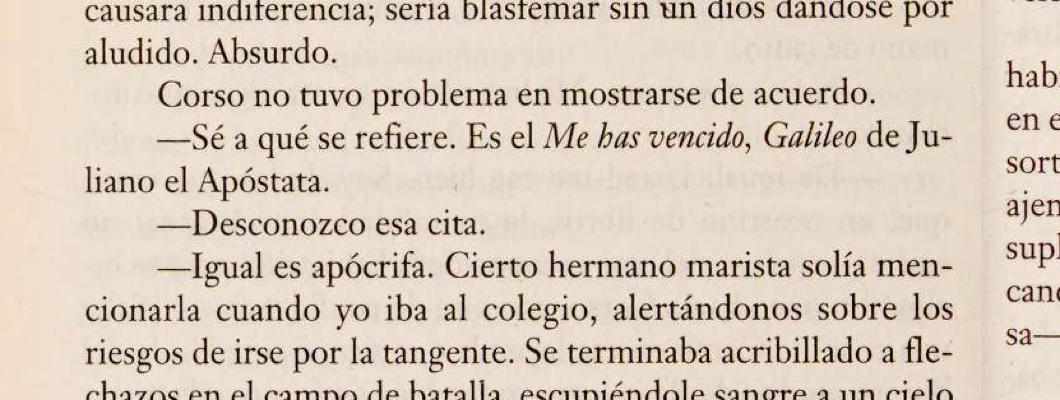
At the moment I am reading a book by Arturo Pérez-Reverte and stumbled across a mistranslation from the Spanish that would have been avoided if only the translator had enjoyed the privilege of being taught by Dr Kernell.
It turns out that the Spanish word for ‘Galilean’ is ‘Galileo’. Pérez-Reverte’s translator, alas, failed to understand one of the characters reference to Julian’s final words and mistook Christ our Saviour for an Italian astronomer, mistranslating the phrase as “You have defeated me, Galileo”.
Worth a wry smile, given the solid 1,200-year gap between the death of Julian the Apostate and the birth of Galileo Galilei.
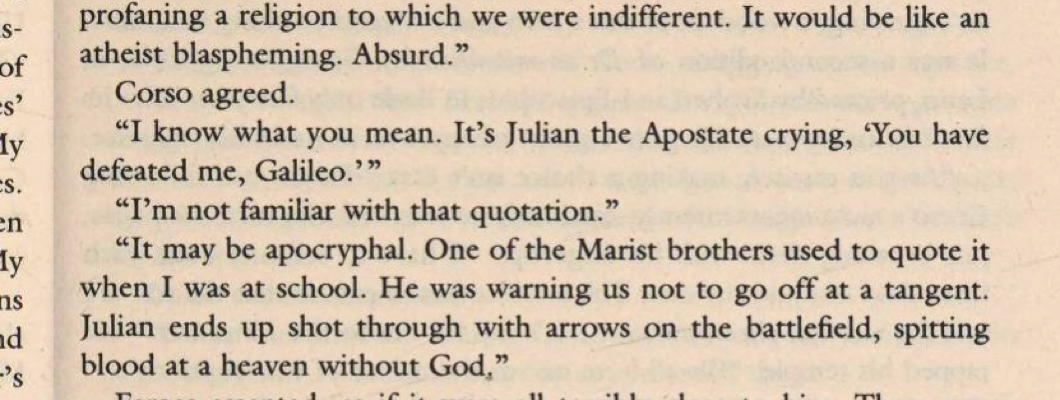
The Dumas Club is a delightfully weird and intriguing tale, though, and I look forward to reading more by Pérez-Reverte — no matter who the translator is.
Monolingual Limitations
I’m 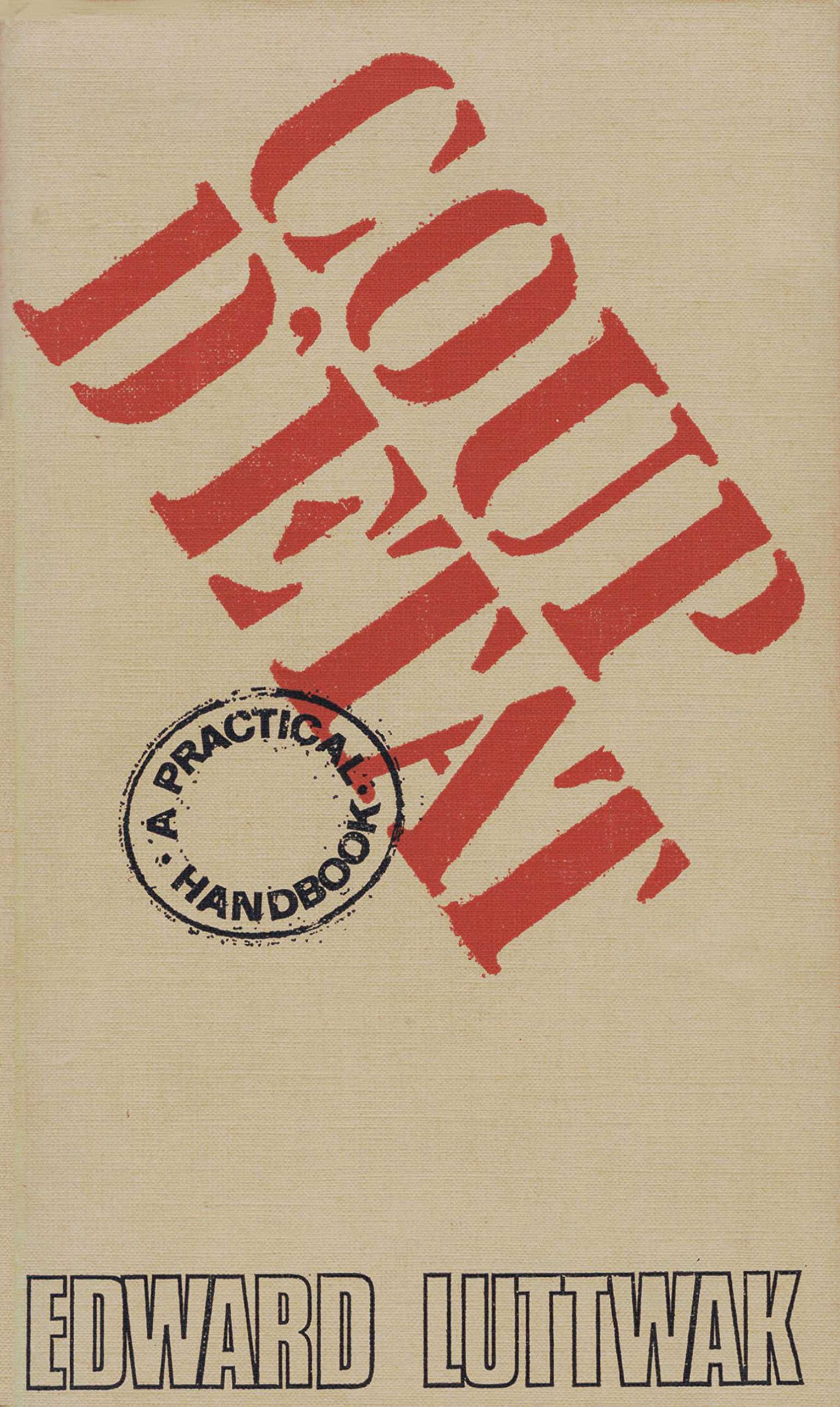 sure I wasn’t the only twelve-year-old whose favourite book was Edward Luttwak’s delicious Coup d’État: A Practical Handbook — an excellent gift from my father. The work gave me a lifelong fascination with the golpe de Estado, a phenomenon of government all too increasingly a rare species in our post-Cold War era.
sure I wasn’t the only twelve-year-old whose favourite book was Edward Luttwak’s delicious Coup d’État: A Practical Handbook — an excellent gift from my father. The work gave me a lifelong fascination with the golpe de Estado, a phenomenon of government all too increasingly a rare species in our post-Cold War era.
Just about everything written or said by Luttwak — lately a cattle farmer in Paraguay — is worth reading or listening to. For a start you could read his contributions to the LRB or to the excellent American Jewish Tablet magazine.
I have been waiting for someone to offer a refutation of his provocative Prospect essay on how the Middle East is less relevant than ever, and it would be better for everyone if the rest of the world learned to ignore it.
David Samuels chat with Luttwak this month on the subject of the Three Blind Kings — Putin, Biden, and Xi — offers some superb insights as well as amusements.
Among the lessons that Luttwak is keen to drive home — and he says so over and over and over again on Twitter — is that American intelligence-gathering (and government in general) is too reliant on technology with too few officials, analysts, and operatives actually learning the language of those they are attempting to surveil.
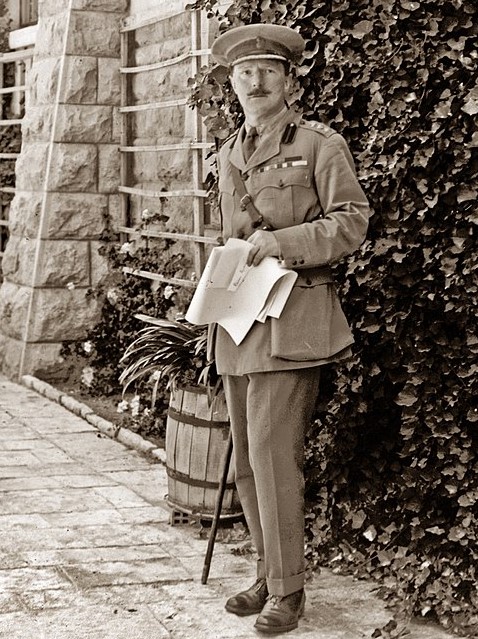 That this state of monolingual limitation was not always the case was driven home in an excellent piece by Jonathan Gaisman in the February 2022 New Criterion concerning Sir Ronald Storrs (left, 1881–1955) — “the most brilliant Englishman in the Near East” as Lawrence of Arabia called him.
That this state of monolingual limitation was not always the case was driven home in an excellent piece by Jonathan Gaisman in the February 2022 New Criterion concerning Sir Ronald Storrs (left, 1881–1955) — “the most brilliant Englishman in the Near East” as Lawrence of Arabia called him.
An accomplished Arabist, Storrs served as Oriental Secretary for the British administration in Egypt before going on to become Military Governor of Jerusalem, Governor of Cyprus, and Governor of Northern Rhodesia, from which role he retired on health grounds, returned to the metropole, and served a few years on London County Council.
Gaisman relays this delicious anecdote from the British official’s 1937 autobiography Orientations:
Sometime in 1906 I was walking in the heat of the day through the Bazaars. As I passed an Arab café an idle wit, in no hostility to my straw hat but desiring to shine before his friends, called out in Arabic, “God curse your father, O Englishman.”
I was young then and quicker-tempered, and foolishly could not refrain from answering in his own language that I would also curse his father if he were in a position to inform me which of his mother’s two and ninety admirers his father had been.
I heard footsteps behind me and slightly picked up the pace, angry with myself for committing the sin [of] a row with Egyptians. In a few seconds I felt a hand on each arm. “My brother,” said the original humorist, “return, I pray you, and drink with us coffee and smoke. I did not think that Your Worship knew Arabic, still less the correct Arabic abuse, and we would fain benefit further by your important thoughts.”
Gaisman further spoils us with another excellent story — this time about Storrs’ predecessor as Oriental Secretary in Cairo, Mr Harry Boyle:
[Boyle] was taking his tea one day on the terrace of Shepheard’s Hotel when he heard himself accosted by a total stranger: “Sir, are you the Hotel pimp?”
“I am, Sir,” Boyle replied without hesitation or emotion, “but the management, as you may observe, are good enough to allow me the hour of five to six as a tea interval. If, however, you are pressed perhaps you will address yourself to that gentleman,” and he indicated [the self-made tea magnate] Sir Thomas Lipton, “who is taking my duty; you will find him most willing to accommodate you in any little commissions of a confidential character which you may see fit to entrust to him.”
Boyle then paid his bill, and stepped into a cab unobtrusively, but not too quickly to hear the sound of a fracas, the impact of a fist and the thud of a ponderous body on the marble floor.
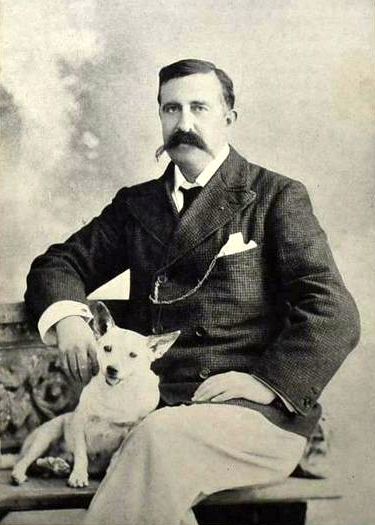 Boyle’s 1937 obituary in the Palestine Post noted he was “a gifted linguist, speaking no fewer than twelve languages”. When Lord Cromer was Britain’s proconsul in Egypt, he and Boyle were such frequent perambulators along the Nile that Boyle earned the nickname Enoch, for he “walked daily with the Lord”.
Boyle’s 1937 obituary in the Palestine Post noted he was “a gifted linguist, speaking no fewer than twelve languages”. When Lord Cromer was Britain’s proconsul in Egypt, he and Boyle were such frequent perambulators along the Nile that Boyle earned the nickname Enoch, for he “walked daily with the Lord”.
During these walks, Cromer was keen to mix with Egyptians of the most humble backgrounds and was aided by Boyle’s linguistic skills. Such was his excellence in Arabic that, returning to Egypt many years later, Boyle was recognised by a peasant farmer many miles outside of Cairo and warmly embraced as the man who used to walk the Nile with the British lord.
“In the hot and brooding nights of the Egyptian summer,” the Post appreciation also relates, “when all who were at liberty to do so had fled to cooler climes, Cromer and Harry Boyle might often have been seen seated after dinner on the veranda of the Agency in Cairo reading aloud alternately passages from the Iliad.”
Perhaps all is not lost. While I can’t speak for the state of the gift of tongues at Langley, at least the Prime Minister of the United Kingdom can launch into Homer, in Greek, from memory.
But Luttwak would surely be right to retort that it is among the mid-level officials and analysts that linguistic skills are most missing — nor are we currently threatened by Athens, Sparta, or Corinth.
Some Finnish Words
We’ve been rather too neglectful of Finnish, the language so beloved of Tolkien. The South-African-born philologist and mythmaker described his introduction to the Finnish tongue as being “like discovering a complete wine-cellar filled with bottles of an amazing wine of a kind and flavour never tasted before. It quite intoxicated me.” Aside from Tolkein’s love of the Finnish language, Elias Lönrott’s Kalevala epic was a central influence on the creation of The Lord of the Rings, as numerous scholars have written about.
I mentioned kaupunkilaissuomenruotsalaiset on Facebook the other day, and Sara piped up with the remainder of the following list of Finnish words. (more…)
À bas l’Académie anglaise!
Proponents of an Academy of English are guilty of leaps of logic
IT STANDS AS one of the great monuments of autonomy and decentralisation that ever existed — the English language. But this great monument is under threat from an unlikely source: one sworn to defend it. The Queen’s English Society has announced plans to form an “Academy of English” along the lines of the Académie française for French or the Real Academia Española for Spanish.
“People misunderstand things if language is not used correctly,” argues Rhea Williams of the Queen’s English Society. “Misuse of apostrophes is the best-known problem, but people also don’t seem to know about tenses any more, for example, you hear ‘we was’ a lot.”
“An academy is needed because the correct information is not something that people can find easily. I suspect that many people in this country have easier access to a computer than to a reference book. They will be able to search without embarrassment, although people should be unafraid to say that they do not know what a word means.”
“At the moment, anything goes,” says Martin Estinel, the founder of the new academy. “Let’s set down a clear standard of what is good, correct, proper English. Let’s have a body to sit in judgment.”
No less an authority than Gerald Warner of Craiggenmaddie has waded into the debate, asserting on his Telegraph blog that “all champions of literacy will wish the society success.”
The complaints raised have a great deal of justification behind them, but the establishment of an academy does absolutely nothing to solve them. Indeed, the very complaint that the misuse of English is rampant and on the rise correctly presupposes that we are already able to discern proper English from improper English.
Rhea Williams and her confrers assume that when a person says “we was”, he is also claiming that it is right and proper English for him to say so. But, on the contrary, if you heard someone on the bus say “we was” and then inquired “Is that proper English?” he would almost certainly, if perhaps sheepishly, admit that it is not.
Similarly we hear complaints about “text speak”, as the shorthand version of English used in text messages (also known as SMSs) is called. But text speak similarly makes no claims to being acceptable as proper English. None would dream of preparing a job application, for example, in text speak.
Furthermore, the Queen’s English Society does not even use proper English on its website.
The Society aims to start using its BLOG [sic] again, following a period of inactivity. If you have something to say about the English language, in the context of education, employment, the media and feel able to contribute to the debate, we invite selected guest bloggers to send in their blogs.
“Blog” is a contraction of “web log” which has rapidly achieved legitimacy, and refers to the entirety of a blog, but the QES almost certainly used the word “blog” instead of what they actually meant, “blog entries”.
The very word “blog” itself is a perfect example of the threat to English that establishing an academy poses. I dislike the word myself, but its usefulness is inescapable. We needn’t refer to that wide and varying array of websites which are in fact an agglomeration of personal writings and links to other items of note — we can simply say “blogs”. An English Academy, on the other hand, might have banished “blog” from its fatuous version of what constitutes proper English early on, in which case the language would be all the poorer, or at least all the more cumbersome.
English speakers know good use from poor use, and when they’re not sure they overwhelmingly defer to those who do know. An Academy of English would do more harm than good and would solve none of the problems that would provoke its foundation. A massive and broad-based information campaign, on the other hand, paired with the return of authoritative teaching in schools, would aid the better use of English infinitely more than a body of pedants to settle disputes that do not exist. Pressure must be exercised against broadcasters, who spread improper English through a misguided attempt at authenticity, and we must also challenge the widespread perception of a social bias against proper speaking.
All these things can be done without any academy, and indeed establishing one would take energy away from these efforts. I’m sure therefore that, pace Mr. Warner, all champions of literacy will join me in shouting “À bas l’Académie anglaise!”
Titles in Afrikaans
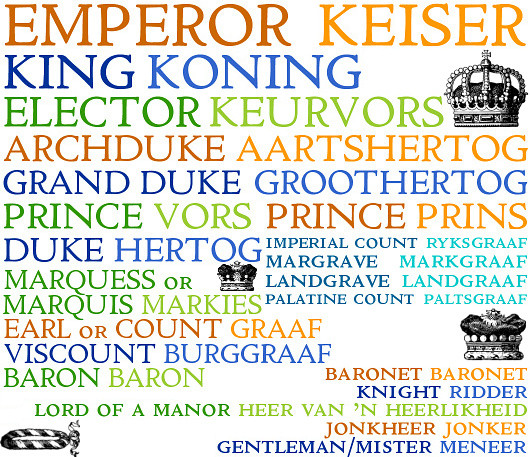
ROYAL, NOBLE, AND common titles in Afrikaans are, like most of the language, descended from Dutch antecedents which, in turn, come from German. The Cape knew not the Kingdom of the Netherlands, which was established after the Dutch relinquished the colony, but was founded as an outlet of the Dutch East India Company (or V.O.C., to give its Dutch acronym). After a brief period of British occupation, Dutch dominion over the Cape returned during the Batavian Republic before finally being seized by the British in 1806 and erected as a British colony in 1814. When the Union of South Africa was created in 1910, the country had its first king, George V, though the sovereign was generally only referred to as ‘King of South Africa’ from 1927 onwards.
The country has had no emperors, though some like to attribute that title to Shaka, the greatest King of the Zulus. Typically, however, he is known as king (as in King Shaka International Airport, Durban’s brand new landing-place). South Africa’s royalty have tended to be either native (like Prince Nelson Rolihlahla Mandela) or German (like Prince Hubertus of Prussia, d. 1950, and a few Blüchers, etc.). (more…)
An Old Dutch Holdout
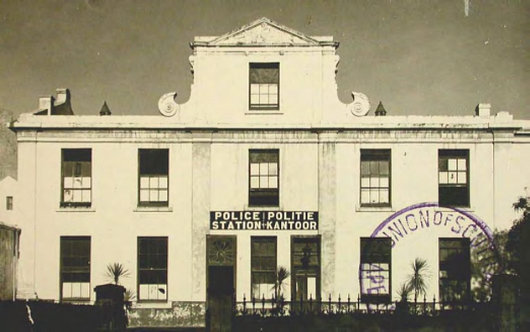
The sign on the façade of No. 7 Wale Street, Cape Town in this 1891 photo informs us of its status as a police station in the two official languages of the day, English and Dutch, not Afrikaans. ‘Politie’ is the Dutch word for Police, while the Afrikaans is ‘Polisie’. Afrikaans only became an official language of South Africa in 1925, but was so alongside Dutch and English until 1961, when Dutch was finally dropped.
This beautiful old Dutch townhouse, with its typical dak-kamer atop, didn’t survive as late as 1961. The Provinsiale-gebou, home to the Western Cape Provincial Parliament, was built on the site in the 1930s. Those who viewed the 2009 AMC/ITV reinterpretation of “The Prisoner” might remember an outdoors nighttime city scene after the main character leaves a diner, with the street sign proclaiming “Madison Ave.” and plenty of yellow New York taxicabs streaming past. The large arches in the background are the front of the Provinsiale-gebou.
Tibetan Word of the Day
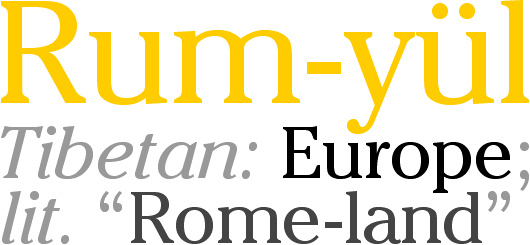
Our Tibetan word of the day is Rum-yül, the language’s traditional word for “Europe”.
The word literally means “Rome-land”, giving a certain Bellocian tone to the Tibetan language — it was Belloc, after all, who said “Europe is the Faith; the Faith is Europe”.
The He/She/It Whatnot
Seraphic Spouse held a poll on what pronouns people prefer using when referring to God: 1) He/Him/Himself, 2) he/him/himself, or 3) avoiding male pronouns. The unsurprising results were 89% for the traditional He/Him/Himself, 9% for the New York Times option of he/him/himself, and just over 1% for the radical choice of avoiding male pronouns altogether.
“Some readers may be wondering why this matters so much,” saith Lady Seraphic. “The answer is that people do care about these things, and I don’t want any reader of the book to feel alienated. I want everyone who might read such a book to feel embraced. And just as a now-elderly generation of Catholic women felt alienated by masculine language for God, younger generation of Catholics want to conserve the great respect for God now lacking in secular society.”
Over at Epigone’s Eloquence, meanwhile, Turgonian watched a biased BBC documentary (those three words go together so often!) on Gnosticism and was inspired to write ‘Why God is a He’, looking to the Monologion of St. Anselm for the answer.
“St. Anselm has previously established that God is Spirit, not a body, and that it is therefore nonsensical to say that He is a man or a woman. He has also shown that it is reasonable to believe that God exists as Father and Son (the Holy Spirit will come later in the book). But, he asks, why Father and Son, rather than Mother and Daughter? Why not call them by feminine names?” Read on to find out.
Il degrado della lingua italiana
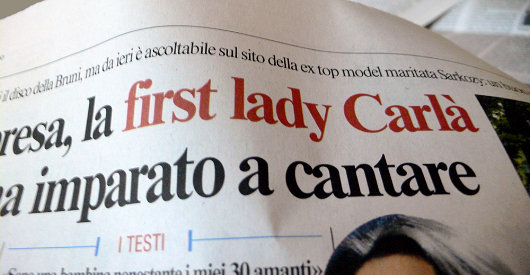
The French are always the one’s worrying about the revolting infiltration of English upon their beautiful and august language — and rightly so — but in my experience it is the Italians who should be worrying. One need only look at their newspapers to see the wretched expansion of English into one of the most beautiful languages of Europe, and indeed the world. Carla Bruni is “la first lady”? What’s wrong with “prima signora” or some other such equivalent. (more…)
NRC, among others, gets it right
The Netherlands’ premier broadsheet has gone partly English online
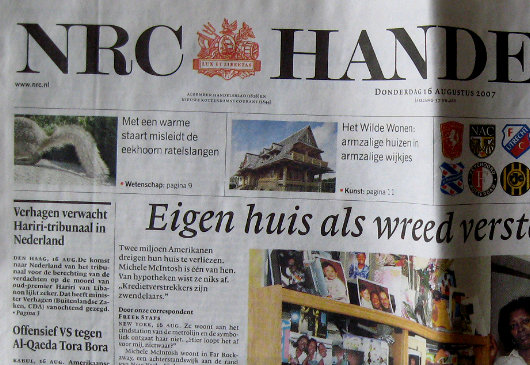
The moderate liberal Dutch broadsheet NRC Handelsblad is the latest of a series of European periodicals looking for a more international readership by translating part of their content into English for distribution on the world wide web. “NRC International” is partnered with the German weekly magazine Der Spiegel, itself a pioneer in featuring English content in an “international” section of its website. Aside from NRC and Der Spiegel, other news outlets now featuring web-only English-language content are Germany’s Die Welt and Hungary’s Heti Világgazdaság, while Eurozine features translated and original content from a broad spectrum of continental reviews and journals. Sadly, Sign and Sight recently had to reduce their “From the Feuilletons” — looking at the culture pages of German-language newspapers — from a daily to a weekly feature. Sign and Sight also features a weekly “Magazine Roundup” doing the rounds of a wide variety of European, Asian, and American magazines.
The move comes as print newspapers of the conventional variety across Europe and America are losing circulation. Some Manhattan newsstands have seen takers for the Sunday New York Times fall by as much as 80% in the past few years. The New York Times and Wall Street Journal both recently narrowed their page width in a move to save paper costs; the change, however, also means less room for advertising and a more ungainly appearance.
South Africa’s Herald, meanwhile, has bucked the gloomy trend and increased its readership by 14.5% in the past year. The Herald, the Eastern and Southern Cape’s regional broadsheet, attributes its success to a visual redesign and reorienting content to encourage readers to link up with the newspaper’s website. South Africa is also home to The Times (not to be confused with the older Cape Times), a new upmarket broadsheet newspaper launched as a daily extension of the century-old Sunday Times. The weekday Times was started a year ago and its circulation since just June has seen a 10.4% increase.
A major problem for the industry is that formerly high-end newspapers have driven down the quality of their product to a suicidal extent over the past decades. The middle market, for better or worse, is dead, and publishers have three alternatives to this disappearing sector: 1) go lowest-common-denominator — as The Times of London has done, with only moderate success; 2) go up-market — The Times and Sunday Times of South Africa have proved worthwile; or 3) go niche — the New York Observer is still in business after two decades of aiming towards Manhattan’s yuppie community.
Whichever path taken, integrating print and web operations is vital for the survival of print newspapers and other “dead tree” media. That European newspapers are providing at least part of their content in English is helpful in keeping up with events and ideas in countries like Germany, the Netherlands, and Hungary as our native English-language media are tightening their belts and cutting foreign correspondents and coverage. I hope more non-English papers follow this trend and help to permanentize it.
My American English
|
Your Linguistic Profile:: |
| 50% General American English |
| 30% Yankee |
| 15% Dixie |
| 0% Midwestern |
| 0% Upper Midwestern |
I generally concur with the results of this quiz.
Search
Instagram: @andcusack
Click here for my Instagram photos.Most Recent Posts
- Burns Tower April 19, 2024
- Patrick in Parliament March 18, 2024
- Articles of Note: 13 March 2024 March 13, 2024
- Cambridge March 9, 2024
- Taken on Trust March 4, 2024
Most Recent Comments
Book Wishlist
Monthly Archives
Categories


